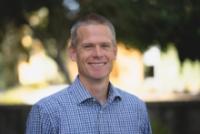
Jason T. DeJong is a Professor at the University of California, Davis. He received a B.S.C.E. from UC Davis and an M.S.C.E. and Ph.D. at the Georgia Institute of Technology. After working at the Centre for Offshore Foundation Systems at the University of Western Australia and the University of Massachusetts Amherst, Jason moved back to his hometown of Davis, CA in 2005.
His work has been funded through grants totaling more than $7 million and results have been disseminated through more than 125 publications. His work has been recognized through the ASTM International Hogentogler Award (2x), the ICE TK Hsieh Prize, the ASCE Huber Research Prize, the ASCE Casagrande Professional Development Award, and the Prakash Research Award, among others.
Arguably the next advent for the geotechnical engineering profession is to recognize that soil itself is a living ecosystem. For example, more than 10^6 bacteria are typically present in 1 cm3 of poorly graded quarry sand typically used as backfill or roadway subgrade materials in engineering works. The living nature of soil can involve biological and chemical changes that challenge our traditional understanding/assumptions regarding the time-dependent stability in soils. Over the past 15 years, geotechnical researchers have formed interdisciplinary teams with microbiologists and geochemists to merge their knowledge and identify bio-mediated processes that may be accelerated in time to induce changes in soil that result in significant improvements in engineering soil properties. More recently, researchers have started to study biological systems, which have optimized their functions over the millennia within their local ecological constraints, to identify the forms, functions, and principles of these systems that may lead to bio-inspired engineering solutions that are more efficient and sustainable than those currently used in engineering practice.
This presentation will first present an overview of the emerging field of sustainable biogeotechnics by describing frameworks for exploring bio-mediated and bio-inspired technologies, complimented with several examples. Recent technical advances in the bio-mediated processes of biocementation and biofilm formation will then be presented in detail. Biocementation technology, enabled by microbially induced calcite precipitation at particles contacts in granular soils, is developing rapidly as it can induce step changes in soil strength, stiffness, permeability, modulus, etc. Upscaling from the laboratory to full scale implementation on industry projects requires overcoming challenges regarding biostimulation of native bacteria, improving treatment uniformity, and developing metrics to verify successful treatment. Results from recent prototype tests are used to present advances in these issues. Biofilm formation, enabled by the formation of EPS in the granular pore space, is promising as it can temporarily reduce the permeability of sands by 500+ times. Results from recent laboratory tests are presented to explore the treatment effectiveness, treatment permanence, and use of native bacteria in applying the treatment.
Lindsay Walton
lwalton@ucsd.edu
(858)822-3273
